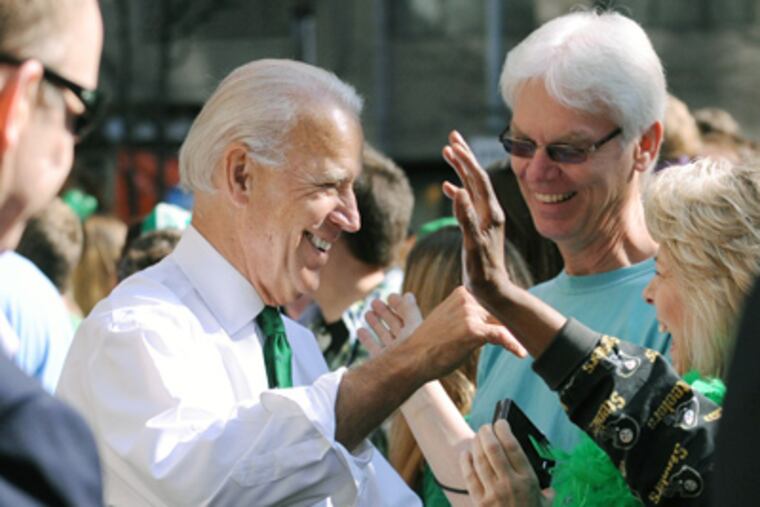Obama's Pa. team still in place from 2008
PITTSBURGH - The Republican presidential candidates are coming to Pennsylvania soon enough. Former Sen. Rick Santorum is speaking in Harrisburg on Saturday. He and his remaining rivals will spend more time in the state as the April 24 primary approaches. But Vice President Biden's appearance Saturday in Pittsburgh at the St. Patrick's Day Parade was a reminder that the Obama campaign is already here. In a sense, it never left.

PITTSBURGH - The Republican presidential candidates are coming to Pennsylvania soon enough.
Former Sen. Rick Santorum is speaking in Harrisburg on Saturday. He and his remaining rivals will spend more time in the state as the April 24 primary approaches. But Vice President Biden's appearance Saturday in Pittsburgh at the St. Patrick's Day Parade was a reminder that the Obama campaign is already here. In a sense, it never left.
After President Obama's 2008 victory, Democrats tried to preserve the core of his effective grassroots organization. Obama for America became Organizing for America, switching its sights from campaigning to the president's legislative agenda. Since the president's formal announcement last year that he was seeking reelection, the grassroots focus has shifted back to campaigning.
On Thursday night, scores of Obama partisans filled the campaign's Pittsburgh office to watch the premiere of the Tom Hanks-narrated video commissioned by the campaign to argue for the president's reelection. Afterward, many of the Democratic activists lingered to work the phones in voter outreach.
Sybil Thompson of Pittsburgh, retired from a career at the R.R. Donnelley publishing company, said she volunteered at the headquarters two or three days a week. The work is familiar. She was a volunteer in 2008.
"For myself, being an African American, I was thrilled to see President Obama have the opportunity to serve," she said. "I think he has accomplished so many different things. He deserves a second term."
Hillary Darville, a 2011 graduate of Pennsylvania State University, said she left a job at a Pittsburgh hospital to devote more hours to volunteering. She worked for the campaign on the State College campus the last time around. Her enthusiasm has not waned, but she acknowledges that it is a challenge to rekindle the excitement of some of the voters she contacts.
"The one thing I tell people who are discouraged is it takes a lot to get things accomplished . . . he deserves a second term to accomplish his agenda."
The Pittsburgh office is one of 12 the Democratic campaign has opened across the state. So far, there are three offices in Philadelphia, two more in its crucial suburbs, and other offices in Allentown, Scranton, Harrisburg, State College, Johnstown, and Erie. While the remaining GOP contenders are concentrating on one another, those offices are focusing on the labor-intensive work of identifying voters and making one-on-one pitches. It is the low-tech end of a state-of-the-art operation that captures the information gleaned from such contacts as grist for sophisticated computer classification of their potential supporters.
One immediate goal of the effort, as the anniversary of the signing of the federal health-care law approaches, is to focus phone banking, house parties, and other outreach on education and promotion of the benefits of the controversial law, preparing the ground for the president's reelection argument.
Pennsylvania was one of the swing states targeted in a recent mass mailing that talked up the benefits of the law to women voters. In Pennsylvania and other states, the campaign has spotlighted "Nurses for Obama" campaigns with health professionals touting the law's benefits.
It is a head start the Obama campaign has asserted in states across the country. In December, as the GOP contenders crisscrossed Iowa, Democrats boasted that they had already established eight offices in the state - more than for all of the current and past Republican contenders combined in Iowa.
The Democrats' logistical advantage relative to the preoccupied Republican contenders is clear. How lasting it will be, with unfettered spending by outside groups this time around, is less certain. American Crossroads, affiliated with former Bush adviser Karl Rove, has already aired one anti-Obama commercial in the state.
"Pennsylvania is certainly shaping up to be a key battleground state," said Jonathan Collegio, chief spokesman for American Crossroads. "Groups like Crossroads, party committees will be intently focused there. . . . It's too early to talk about exact dollar commitment that Crossroads will have in Pennsylvania, but at this time I can say it will be significant.
Robert Gleason, the state GOP chairman, said of his opposition, "We see people already deploying, particularly in the Philadelphia area."
But he professed to be unconcerned with the early efforts. "The average Joe is not paying any attention to presidential politics right now," he said. "The real interest comes in October. So, I'm not a bit concerned about it, but we do expect a hell of a battle. We're down by a million" in voter registration.